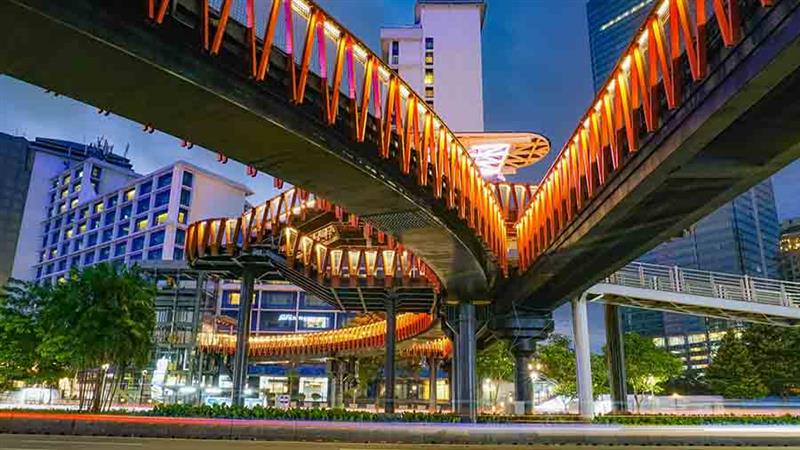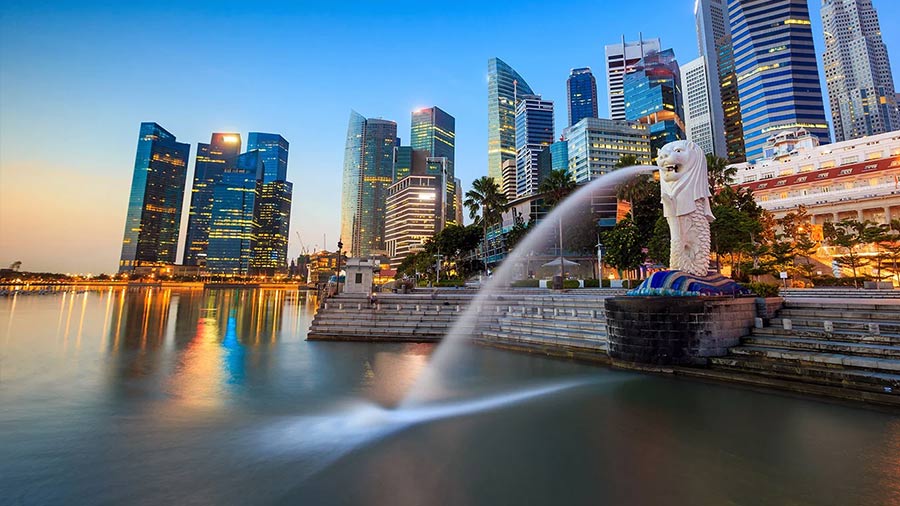Singapore, a vibrant city-state known for its robust economy, consistently ranks high on various global indices, such as the World Bank’s Ease of Doing Business report, strategic location, and pro-business policies, has long been a magnet for global investors. Its well-developed infrastructure, political stability, and highly skilled workforce create an ideal environment for businesses to thrive.
With initiatives like the Smart Nation program, Singapore is at the forefront of adopting cutting-edge technologies to drive economic growth.
Introduction to the Global Investor Programme (GIP) as a pathway to Singapore Permanent Residency (PR) and potential fast-track to citizenship
The Global Investor Programme (GIP) stands out as a premier route for high-net-worth individuals seeking permanent residency in Singapore.
Launched by the Economic Development Board (EDB), the GIP offers a streamlined process for investors who wish to contribute to Singapore’s economic landscape through substantial business investments.
Successful applicants and their immediate family members are granted permanent residency, with the potential to apply for Singapore citizenship after a stipulated period. This not only provides a stable and secure living environment but also offers access to world-class healthcare, education, and a high standard of living.
The GIP thus serves as an attractive proposition for global investors aiming to leverage Singapore’s dynamic economic landscape while securing a prestigious residency status.
The strategic significance of the GIP
The Global Investor Programme strengthens Singapore’s economy by attracting substantial foreign investment. This influx of capital is instrumental in driving economic growth, fostering job creation, and promoting economic diversification.
By encouraging high-net-worth individuals to invest in local businesses or designated funds, the GIP injects much-needed capital into the economy. This not only supports the growth of existing enterprises but also stimulates the establishment of new businesses, thereby broadening the economic base.
Investments made through the GIP directly contribute to job creation across various sectors. Whether it is through the expansion of a business or the launch of new ventures, these investments lead to the creation of numerous employment opportunities, enhancing the overall job market and contributing to economic stability.
The GIP encourages investments across a wide range of industries, fostering a more diversified and resilient economy. By reducing dependency on any single sector, Singapore is better equipped to withstand global economic fluctuations and maintain sustainable growth.
Competitive advantages for investors
Investors opting for the GIP are presented with a suite of competitive advantages that make Singapore an attractive destination for their investments.
Economic stability
Singapore’s robust economic framework is characterized by consistent growth, low inflation, and a strong currency. This stability provides a secure environment for investors to grow their wealth and protect their assets.
Favorable tax policies
The country’s pro-business tax regime includes attractive incentives such as no capital gains tax and relatively low corporate tax rates. These policies enhance the return on investment, making Singapore a highly attractive location for global investors.
Strategic geographic location
Situated at the crossroads of major global trade routes, Singapore provides investors with unparalleled access to regional markets and facilitates the seamless expansion of their business operations.
GIP eligibility criteria
The Global Investor Programme (GIP) offers a structured pathway for high-net-worth individuals to obtain a Singapore Permanent Residency (PR).
To qualify, applicants must meet specific eligibility criteria tailored to different investor profiles, including established business owners, next-generation business owners, founders of fast-growth companies, and family office principals.
|
Investor profile |
Eligibility requirements |
Financial thresholds |
Industry engagement |
Investment options |
|
Established business owners |
|
Annual turnover of at least S$ 200 million (US$ 148 million) in the year before application and an average of S$ 200 million (US$ 148 million) per year for 3 years prior |
Must be engaged in one or more of the approved industries |
Option A, B, or C |
|
Next-generation business owners |
|
Company's annual turnover of at least S$ 500 million (US$ 371 million) in the year before application and an average of S$ 500 million (US$ 371 million) per year for 3 years prior |
Must be engaged in one or more of the approved industries |
Option A, B, or C |
|
Founders of Fast-Growth Companies |
|
Company valuation of at least S$ 500 million (US$ 371 million) |
Must be engaged in one or more of the approved industries |
Option A, B, or C |
|
Family office principals |
|
Net investible assets of at least S$ 200 million (US$ 148 million) |
Not specified |
Option C |
Investment options and criteria
The table below briefly explains the difference between the three investment options for the GIP:
|
Criteria |
Option A |
Option B |
Option C |
|
Investment amount |
S$2.5 million (US$1.8 million) |
S$2.5 million (US$1.8 million) |
S$2.5 million (US$1.8 million) |
|
Type of Investment |
New business entity or expansion of existing business |
GIP-approved fund |
Single-family office with S$ 50 million (US$ 37.1 million) transferred to Singapore |
|
Business plan |
Detailed five-year business plan |
Comprehensive investment plan |
Detailed five-year business plan |
|
Ownership and Management |
At least 30% shareholding, part of the management team |
N/A |
N/A |
|
AUM specifications |
N/A |
N/A |
At least S$50 million (US$37.1 million) of the AUM transferred into Singapore |
|
Industry engagement |
Must operate in approved industries |
Must operate in approved industries |
Must operate in approved industries |
Approved industries
The companies must be engaged in one or more of the approved industries, which typically include:
- Aerospace Engineering;
- Alternative Energy/Clean Technology;
- Automotive;
- Chemicals;
- Consumer Business (e.g. flavors and fragrances, food ingredients, nutrition, home, and personal care);
- Electronics;
- Energy;
- Engineering Services;
- Healthcare;
- Infocom Products & Services;
- Logistics & Supply Chain Management;
- Marine & Offshore Engineering;
- Media & Entertainment;
- Medical Technology;
- Nanotechnology;
- Natural Resources (e.g. metals, mining, agri-commodities);
- Safety & Security;
- Space;
- Shipping;
- Pharmaceuticals & Biotechnology;
- Precision Engineering;
- Professional Services e.g. consulting, design;
- Arts Businesses (a) Visual arts businesses, e.g. auction houses, art logistics/storage (b) performing arts businesses;
- Sports Businesses; and,
- Family Office & Financial Services.
Application Process: A Step-by-Step Guide
Before submitting your GIP application, ensure you have prepared all required documents accurately. This step is crucial as incomplete or incorrect submissions can lead to delays or rejections.
Step-by-step guide
Step 1: Pay the application fee
Make a payment of S$10,000 (US$7,400) as the application fee to the Economic Development Board (EDB).
Step 2: Complete the necessary forms
Fill out the following forms:
- Form A: Application for Permanent Residence for Investors
- Form B: Proposed Investment Plan
- Form C: Payment Details of Application Fee
- Form 4: Application for an Entry Permit to Enter Singapore
- Statutory Declaration Form
- Undertaking on the Terms & Conditions of the GIP
Step 3: Gather the required documents
- Personal documents:
- Certified copy of passport.
- Original or certified copy of a birth certificate.
- Notarised copy of family census/household registry.
- Original or certified copy of marriage certificate (if applicable).
- Two passport-size photos.
- Business and financial documents:
- Evidence of business background.
- Audited accounts of the company for the past three years.
- Certificate of shareholders by the Registrar of Companies.
- Certified copy of a business license or incorporation documents.
- Business plan.
- Curriculum vitae.
- Copy of ACRA registration (if applicable).
Step 4: Submit application
Submit both hard and soft copies of the completed forms and documents to the EDB through the official GIP portal.
Interview overview
If your initial application is successful, you will be invited for an interview with the authorities. This interview is an opportunity to present your business vision and commitment to contributing to Singapore’s economy.
Be well-prepared to discuss your:
- Business plan;
- Investment intentions; and,
- How your contributions will benefit Singapore.
Investment and final PR approval process
- After the interview, your application will undergo a review process. Be prepared to provide additional documentation if requested.
- Upon approval, you will receive an Approval-in-Principle (AIP) status valid for six months. During this period, you must make the required investments under your chosen option (Option A, B, or C).
- Provide evidence of your investments, such as certified true copies of share certificates and bank statements. Submit an Undertaking on the Terms & Conditions of the investment.
- Once your investments are verified, the Immigration and Checkpoints Authority (ICA) will issue a final approval letter. You have 12 months from the date of this letter to formalize your PR status.
- With the final approval, you and your family members will receive Singapore PR status, marked by the issuance of the Blue ID card. This grants you diverse benefits, including tax relief, education subsidies, and medical subsidies.
Additional Visa Options and Comparison
It is essential to be aware of alternative visa options that might better suit your circumstances. In this section, we compare the GIP with other popular visa options such as the EntrePass and the Overseas Network & Expertise (ONE) Pass. Each visa type has distinct criteria and benefits, making it crucial to evaluate which option aligns best with your personal and professional goals.
Comparison of the GIP with EntrePass and ONE Pass
|
Aspect |
Global Investor Programme (GIP) |
EntrePass |
Overseas Network & Expertise (ONE) Pass |
|
Target audience |
High-net-worth individuals ready to make significant investments |
Entrepreneurs looking to start and operate a business in Singapore |
Top-tier professionals, business leaders, and experts |
|
Investment options |
|
N/A |
N/A |
|
Eligibility criteria |
|
|
|
|
Application requirements |
|
|
|
|
Benefits |
|
|
|
|
Application process |
|
|
|
Criteria and benefits comparison
|
Benefit |
GIP |
EntrePass |
ONE Pass |
|
Permanent residency |
Yes |
No |
No |
|
Dependent benefits |
Yes, including education and medical subsidies |
Yes, Dependent's Pass or Long-Term Visit Pass |
Yes, long-term visit passes and educational opportunities |
|
Employment flexibilities |
No, must meet investment requirements |
Yes, can conduct international business activities |
Yes, can work for multiple employers or start a business |
|
Performance-based renewal |
N/A |
Yes, based on business performance and employment of locals |
N/A |
|
Tax Relief and Other Subsidies |
Yes |
No |
No |
|
Ease of Entry and Exit |
Yes, after PR status is granted |
Yes, easier to conduct international business activities |
Yes, provides flexibility for professionals to work and move between employers |
Permanent Residency benefits for family members
PR for spouses and children
When you secure permanent residency (PR) through the Singapore Global Investor Programme (GIP), your immediate family members can also enjoy the numerous benefits that come with PR status. This includes your spouse and unmarried children under 21 years of age.
Eligibility criteria
Spouses:
- Must be legally married to the principal GIP applicant.
- The marriage should be legally recognized under Singaporean law.
Children:
- Must be unmarried and under 21 years of age.
- Should be legally recognized as the offspring (biological or legally adopted) of the principal GIP applicant.
Application Process
- Gather all necessary documents, including certified copies of marriage certificates, birth certificates, and any other relevant legal documents.
- The PR application for family members should be submitted alongside the principal applicant’s GIP application. Ensure all forms are correctly filled and all required documents are included.
- The processing of PR applications for family members generally aligns with the timeline for the principal applicant’s GIP application, which typically takes 9-12 months.
- Once the application is approved, your spouse and children will receive their PR status. This is often accompanied by the issuance of a Blue ID card, granting them various rights and benefits similar to Singaporean citizens.
Long Term Social Visit Pass (LTSVP) for other family members
For family members who do not qualify for PR under the GIP, such as parents, siblings, or other extended relatives, the Long-Term Social Visit Pass (LTSVP) is an excellent alternative. The LTSVP allows these family members to stay in Singapore for an extended period.
Eligibility criteria
Parents:
- Must be the parents of the principal GIP applicant or the spouse of the principal applicant.
- Should demonstrate a need to stay in Singapore for extended family support.
Other family members:
- Must have a close familial relationship with the principal GIP applicant.
- Should provide valid reasons for requiring an extended stay in Singapore (e.g., caregiving responsibilities).
Application process
- Collect all necessary documentation, such as proof of relationship (e.g., birth certificates, marriage certificates), and any other supporting documents.
- Apply for the LTSVP through the Immigration & Checkpoints Authority (ICA) website. Ensure all forms are completed accurately and submitted with the required documents.
- The processing time for LTSVP applications can vary, but it generally takes a few weeks to a few months.
- Once approved, the LTSVP allows the holder to stay in Singapore for up to 2 years, with the possibility of renewal.
Benefits of PR and LTSVP
For PR holders:
- Education: PR children can access local schools and benefit from reduced school fees.
- Healthcare: PR families can enjoy subsidies at public healthcare facilities.
- Employment: PR spouses can work in Singapore without needing an additional work permit.
- Social Benefits: Access to various social services and community benefits.
For LTSVP holders:
- Extended Stay: Allows for longer stays than a standard tourist visa.
- Renewal Options: Can be renewed, offering flexibility for family members needing extended time in Singapore.
- Community Integration: LTSVP holders can integrate into the community, participate in social activities, and support the principal applicant’s family life in Singapore.
FAQs and expert advice on Global Investor Programme
What is the Global Investor Programme (GIP) in Singapore?
The Global Investor Programme is a residency-by-investment initiative by the Singapore government, targeting high-net-worth investors and business owners. It offers a pathway to permanent residency in Singapore for eligible investors who contribute significantly to the country’s economy.
How much do I need to invest in Singapore to get PR?
The required investment ranges from S$2.5 million (US$ 1.8 million) to S$25 million (US$ 18.5 million), depending on the investment option you choose. Additionally, applicants must meet other criteria. If this investment range is not feasible, you might consider alternative visa options like the Professional/Technical Personnel & Skilled Workers (PTS) scheme.
Who is eligible for the GIP?
Eligible applicants typically include established business owners and entrepreneurs with a successful track record, who are prepared to make a significant long-term investment in a Singapore-based company or an approved fund.
What is a GIP-approved fund in Singapore?
A GIP-approved fund is an investment option within the GIP scheme, allowing applicants to invest in funds that focus on Singapore-based companies.
What types of investments qualify for the GIP?
Qualifying investments include:
- Business entities in targeted growth sectors.
- GIP-approved funds investing in Singapore-based companies.
- Establishing a single-family office with significant assets under management.
Can my family also obtain permanent residency through the GIP?
Yes, the GIP includes immediate family members, such as your spouse and children under 21 years of age, in your application for permanent residency.
What is the process to apply for the GIP?
The application process involves:
- Submitting a detailed investment plan.
- Providing evidence of business acumen and investment history.
- Undergoing a thorough assessment by the Economic Development Board (EDB) of Singapore.
How long does it take to process a GIP application?
Processing time generally ranges between 6 to 12 months from the submission of a complete application to the final decision.
Does my male child have to serve in the army if he applies for PR under the GIP?
Yes, male children who obtain PR under the GIP are required to serve the National Service.
What is the validity period of the GIP?
The GIP permanent residency status is valid for five years.
Can I use my existing investments in Singapore as part of the required investment amount?
No, existing investments in Singapore cannot be counted towards the required investment amount for the GIP.
What are the approved industries under the GIP scheme?
The approved industries under the GIP scheme include:
- Aerospace Engineering
- Alternative Energy/Clean Technology
- Automotive
- Chemicals
- Consumer Business (e.g., flavors and fragrances, food ingredients, nutrition, home, and personal care)
- Electronics
- Energy
- Engineering Services
- Healthcare
- Infocom Products & Services
- Logistics & Supply Chain Management
- Marine & Offshore Engineering
- Media & Entertainment
- Medical Technology
- Nanotechnology
- Natural Resources (e.g., metals, mining, agri-commodities)
- Safety & Security
- Space
- Shipping
- Pharmaceuticals & Biotechnology
- Precision Engineering
- Professional Services (e.g., consulting, design)
- Arts Businesses (visual arts businesses, e.g., auction houses, art logistics/storage, performing arts businesses)
- Sports Businesses
- Family Office & Financial Services
Are there any other benefits to the GIP besides permanent residency?
Beyond permanent residency, GIP participants benefit from Singapore’s business-friendly environment, robust legal system, strategic geographical location, and access to a network of global investors.
Is there a renewal process for GIP permanent residency?
Yes, the GIP permanent residency status requires renewal every five years. Applicants must fulfill certain investment conditions and residency requirements to renew their status.






















